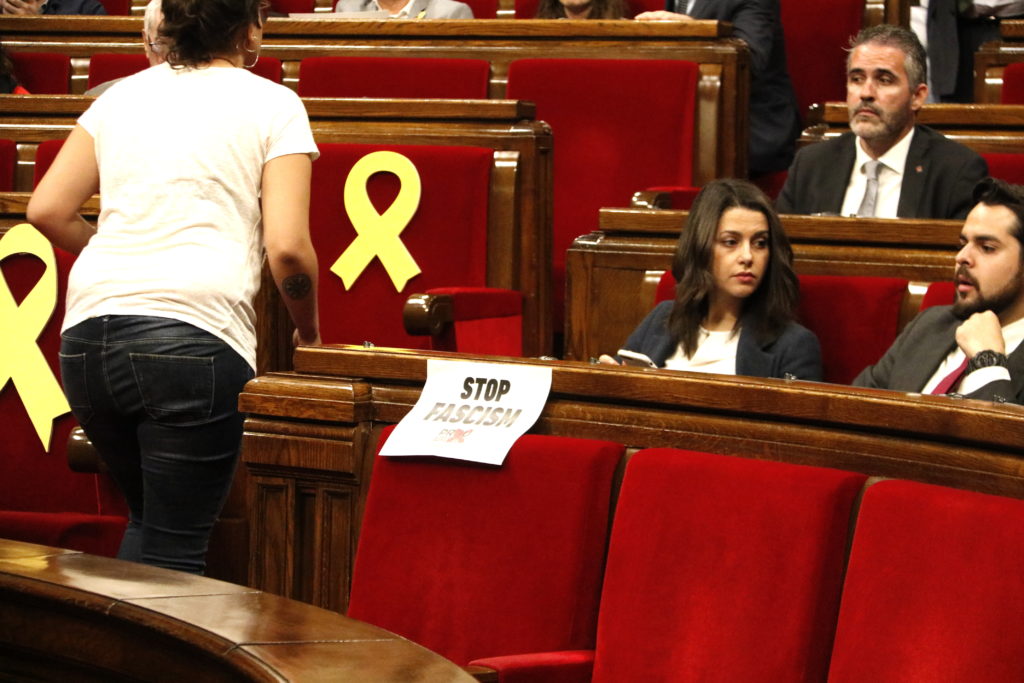19.06.2018 - 07:48
|
Actualització: 19.06.2018 - 09:48
The recent political turmoil in Catalonia, including the incarceration of political leaders, has not only led to widespread demonstrations across the country. Streets and urban furniture have been increasingly dyed in yellow, the color which has become synonymous with the solidarity movement for pro-independence leaders in jail and abroad, including most of the Carles Puigdemont deposed cabinet members. Yet this is not making everyone happy, and has become another cause for controversy in the country.
A senior MP of the main unionist party in the Catalan Parliament, Ciudadanos (Cs), removed a yellow ribbon from the empty government seats in the chamber on Friday. The ribbons were placed there in solidarity with the pro-independence officials who are either in jail or abroad. This led to a sharp exchange of words with the Parliament speaker, Roger Torrent, who suspended the plenary session. “I won’t allow this parliament to be a madhouse or a playground” he told the Ciutadans MP, Carlos Carrizosa. Some minutes later, the Catalan president, Quim Torra, tweeted that “the yellow ribbon now more than ever represents the Catalan government”.
On Monday, some twenty people in balaclavas stormed an installation in which yellow was the protagonist in order to vandalize it. And the Spanish government is also taking action to end this silent form of protest.
Madrid letter to mayors
Mariano Rajoy’s executive delegate in Catalonia, Enric Millo, has sent a letter to the nearly 1,000 Catalan mayors asking them to maintain “neutrality” in public spaces. In his message sent on Tuesday, he claims that mayors have the “obligation” to not allow such symbols. According to him, this has caused “a break in the co-existence” in some cases. Millo stated in his letter that in the past few months, some streets, squares and public buildings “are being occupied by these biased symbols”.
Indeed, yellow ribbons are visible drawn on pavements, monuments, traffic lights, fences, façades of libraries and schools… and even on the balconies of town halls and administration buildings, as well as in parliament, in the empty seats of MPs in prison or abroad. During the campaign ahead of the December 2017 Catalan election, the Spanish electoral board obliged local councils to remove yellow signs from public buildings.
Attack on a yellow-flooded beach
And now some beaches are becoming filled with the colour yellow. On Monday, an installation of yellow crosses, in solidarity with Catalan pro-independence leaders, in the sand in Canet de Mar, north of Barcelona, ended up becoming the focal point of a confrontation. A group of people with their faces concealed removed some of the crosses a few hours after they had been installed, and this led to a clash between the promoters of the symbols and the gang in balaclavas. The events sparked criticism from pro-independence parties, who branded the vandals’ moves as “fascist attacks.” To show its support for the installation, a nearby city, Mataró, will set up yellow crosses on its beach as well this Sunday.
In Barcelona, the presence of yellow signs has also led to anti-independence groups reacting and removing them. On May 7 at night, at least three such groups called for actions in the city to clear the colour yellow from the streets. Yet another “anti-fascist” march faced them shouting and chanting. The Catalan police made sure the confrontation did not escalate into violence.
Towns regulating political symbols
Yet the controversy has spread across the country. For instance, the hardliner pro-independence mayor of Arenys de Munt said that his town will be the first one to “fine whoever removes yellow ribbons.” On the contrary, the unionist Socialist local government in Castellbell i el Vilar intends for people to require permission before placing yellow ribbons in a public space.
Yellow ribbons on lapels, questioned?
While the Spanish government and some unionist and radical groups continue to try to eliminate any sign of support for the leaders imprisoned or in exile, there is a place where they will hardly be able to regulate yellow ribbons: on one’s person. A number of people these days wear the sign on their jackets, lapels, shirts, blouses and rucksacks, including a lot of Catalan administration officials and most of the MPs in Parliament.
Yet no one can rule out that this might change in the near future: reportedly some individuals have been barred to marry or testify in local courts wearing yellow ribbons. Recently, FCBarcelona fans also had yellow T-Shirts, ribbons and flags confiscated before entering the stadium where the Spanish Copa del Rey was held in Madrid.
As long as Catalan politicians continue behind bars or seeking refuge in other countries, this controversy is also likely to drag on.


